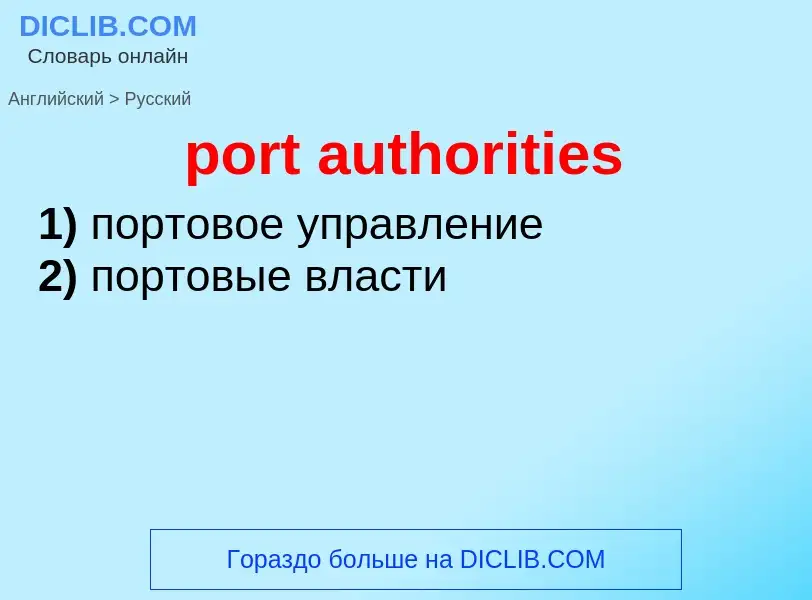Μετάφραση και ανάλυση λέξεων από την τεχνητή νοημοσύνη ChatGPT
Σε αυτήν τη σελίδα μπορείτε να λάβετε μια λεπτομερή ανάλυση μιας λέξης ή μιας φράσης, η οποία δημιουργήθηκε χρησιμοποιώντας το ChatGPT, την καλύτερη τεχνολογία τεχνητής νοημοσύνης μέχρι σήμερα:
- πώς χρησιμοποιείται η λέξη
- συχνότητα χρήσης
- χρησιμοποιείται πιο συχνά στον προφορικό ή γραπτό λόγο
- επιλογές μετάφρασης λέξεων
- παραδείγματα χρήσης (πολλές φράσεις με μετάφραση)
- ετυμολογία
port authorities - translation to ρωσικά
Ορισμός
Βικιπαίδεια
In Canada and the United States, a port authority (less commonly a port district) is a governmental or quasi-governmental public authority for a special-purpose district usually formed by a legislative body (or bodies) to operate ports and other transportation infrastructure. In Canada, the federal Minister of Transport selects the local chief executive board member and the rest of the board is appointed at the recommendation of port users to the federal Minister; while all Canadian port authorities have a federal or Crown charter called letters patent.
Numerous Caribbean nations have port authorities, including those of Aruba, British Virgin Islands, Bahamas, Jamaica, Cayman Islands, Trinidad and Tobago, St. Lucia, St. Maarten, St. Vincent and the Grenadines.
Central and South America also have port agencies such as autoridad and consorcio (authority and consortium).
In Mexico, the federal government created sixteen port administrations in 1994–1995 called Administración Portuaria Integral (Integral Port Administration) in Spanish, as result of the Ley de Puertos (Port Law) of 1993. These are organized as variable capital corporations (Sociedad Anónima de Capital Variable), with the intent of creating more private investment in a state owned sector.
Port authorities are usually governed by boards or commissions, which are commonly appointed by governmental chief executives, often from different jurisdictions.
Most port authorities are financially self-supporting. In addition to owning land, setting fees, and sometimes levying taxes, port districts can also operate shipping terminals, airports, railroads, and irrigation facilities.


![Harbormaster's shanty, Hingham harbor, [[Hingham, Massachusetts]]. Harbormaster's shanty, Hingham harbor, [[Hingham, Massachusetts]].](https://commons.wikimedia.org/wiki/Special:FilePath/HarborMasterHingham.jpg?width=200)
